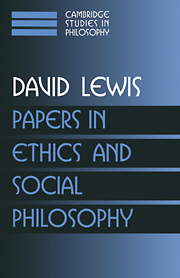Book contents
- Frontmatter
- Contents
- Introduction
- 1 Semantic analyses for dyadic deontic logic
- 2 A problem about permission
- 3 Reply to McMichael
- 4 Why ain'cha rich?
- 5 Desire as belief
- 6 Desire as belief II
- 7 Dispositional theories of value
- 8 The trap's dilemma
- 9 Evil for freedom's sake?
- 10 Do we believe in penal substitution?
- 11 Convention: Reply to Jamieson
- 12 Meaning without use: Reply to Hawthorne
- 13 Illusory innocence?
- 14 Mill and Milquetoast
- 15 Academic appointments: Why ignore the advantage of being right?
- 16 Devil's bargains and the real world
- 17 Buy like a MADman, use like a NUT
- 18 The punishment that leaves something to chance
- 19 Scriven on human unpredictability (with Jane S. Richardson)
- Index
13 - Illusory innocence?
Published online by Cambridge University Press: 24 December 2009
- Frontmatter
- Contents
- Introduction
- 1 Semantic analyses for dyadic deontic logic
- 2 A problem about permission
- 3 Reply to McMichael
- 4 Why ain'cha rich?
- 5 Desire as belief
- 6 Desire as belief II
- 7 Dispositional theories of value
- 8 The trap's dilemma
- 9 Evil for freedom's sake?
- 10 Do we believe in penal substitution?
- 11 Convention: Reply to Jamieson
- 12 Meaning without use: Reply to Hawthorne
- 13 Illusory innocence?
- 14 Mill and Milquetoast
- 15 Academic appointments: Why ignore the advantage of being right?
- 16 Devil's bargains and the real world
- 17 Buy like a MADman, use like a NUT
- 18 The punishment that leaves something to chance
- 19 Scriven on human unpredictability (with Jane S. Richardson)
- Index
Summary
Peter Unger, Living High and Letting Die: Our Illusion of Innocence, Oxford University Press, 1995.
While driving on a deserted road, far away in the bush, you come upon a stranger with a wounded leg. The leg is in a bad way. Unless the stranger reaches a hospital right away, amputation may be unavoidable. You have business of your own to attend to. Taking the stranger to hospital would cost you time and bother. Further, for reasons we need not stop to explain, it would cost you quite a lot of money. Further, you would have to commandeer resources that belong to someone else, knowing full well that the owner would not consent. Still, what else can you do? You do what most of us would do, and take the stranger to hospital.
Another day, you find in your mailbox a printed letter from UNICEF. It tells you, credibly, that in some distant and poverty-stricken place, children are dying for lack of emergency medical assistance. It asks you for a contribution. The treatment required is cheap, and sending your contribution is easy. Saving a distant child's life would cost you far less time, less bother, less money than saving the wounded stranger's leg. And you know that your contribution would make a difference: UNICEF has not enough money to pay for all the lifesaving work it would do if it could, so the more contributions, the more saved lives. Understanding all this, you do what most of us would do: nothing.
- Type
- Chapter
- Information
- Papers in Ethics and Social Philosophy , pp. 152 - 158Publisher: Cambridge University PressPrint publication year: 1999
- 1
- Cited by



